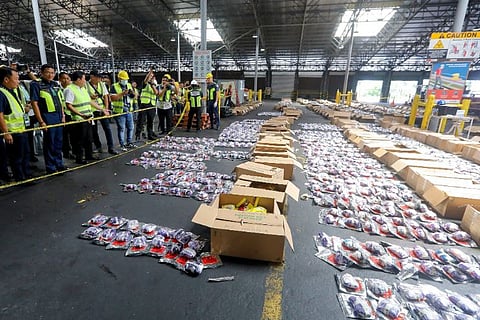
- NEWS
- the EDIT
- COMMENTARY
- BUSINESS
- LIFE
- SHOW
- ACTION
- GLOBAL GOALS
- SNAPS
- DYARYO TIRADA
- MORE

Members of the House of Representatives expressed all-out support for the "bloodless" drug war of President Ferdinand Marcos Jr.— a stark contrast to campaigns waged by his predecessor.
Lawmakers Dan Fernandez, Ace Barbers and Romeo Acop were one in saying that the Marcos administration's bloodless campaign is poised to be more successful with the launch of a reinvigorated campaign but with fewer casualties by law enforcement.
Fernandez, Barbers, and Acop — the chairman of the House Committees on Public Order, Dangerous Drugs, and Transportation, respectively — are currently collaborating to craft legislation that supports the administration's efforts in achieving a more effective drug enforcement strategy without resorting to violence pursuant to Speaker Martin Romualdez's order.
Fernandez's post that the national government will gain "more success" in this new crusade against illegal drugs.
Acop, echoing Romualdez's directive, expressed the necessity of enacting a law that would further improve the Philippine National Police's and other relevant agencies' abilities to effectively reduce, if not totally purge, the menace with zero casualties.
On one hand, Barbers said that the government has to continue strategies in the war on drugs that are "just, humane, and without too much harm" and away from global attention and condemnation.
Several massive shabu hauls were seized under the Marcos admin, including the P3.6 billion shabu seized in Mexico, Pampanga on 27 September. According to Justice Secretary Boying Remulla, this was the biggest catch so far since Marcos assumed office in July last year.
In late August, authorities also seized 200 kilos of "shabu" worth P1.3 billion found abandoned in a car parked at a supermarket in Mabalacat City, Pampanga.
Previously, Barbers declared that authorities had accumulated P30 billion worth of illicit drugs, comprised of 4.4 tons of shabu and nearly three tons of dried marijuana leaves.
Meanwhile, last week, the Philippine Drug Enforcement Agency recorded a 52 percent decrease in the number of deaths in anti-illegal drugs operations — with only 19 fatalities from July 2022 up to September this year, compared to the 40 death toll for the same period from 2020 to 2021.
The report mustered the support of numerous House lawmakers who now advocate for nonviolent means to achieve the government's objectives rather than resorting to violence.
